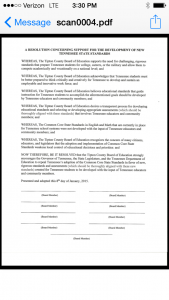Commissioner of Education Candice McQueen issued an email to teachers today clarifying an email she sent Monday regarding Tennessee standards and the upcoming TNReady tests.
It seems there was some confusion about what standards to teach in the 2015-16 academic year and what Tennessee standards may look like going forward.
Below is today’s email followed by the one sent Monday:
Teachers,
I’m writing to clarify information I shared on Monday about the standards review and development process. We have received several questions about which standards teachers should use during the 2015-16 school year. We want to make sure that your questions are answered quickly, so you can move into summer with clear expectations for the upcoming school year.
Tennessee teachers should continue to use the state’s current academic standards in English language arts and math, not the previous SPI’s. The current state standards are available on our website.
TNReady, the state’s new and improved TCAP test in English language arts and math, will assess the state’s current academic standards in English language arts and math, not SPI’s.
As we shared on Monday, the standards review and development process that Gov. Haslam and the State Board of Education established last fall will continue. Teams of educators will work to review public input and will then recommend new sets of math and English language arts standards to the State Board of Education to be fully implemented during the 2017-18 school year. TNReady will evolve as our math and English language arts standards do, ensuring that our state assessment will continue to match what is being taught in Tennessee classrooms.
Please feel free to reach out with additional questions or clarifications. We look forward to sharing more information about TNReady and the standards review and development process in the coming weeks.
Best,
Candice
______________________________
From: Commissioner.McQueen@tn.gov
Date: Monday, May 11, 2015 3:20 PM
To: Tennessee teachers
Subject: Update on Standards Review Process
Teachers,
The Tennessee General Assembly recently voted to support our administration’s efforts to ensure that Tennessee students graduate from high school ready for post-secondary education or the workforce.
The vote complements the academic standards review and development process established by Gov. Haslam and the State Board of Education last October, and it will maintain the participation of Tennessee educators and parents in the process.
At the conclusion of the review process, Tennessee’s new academic standards, which will include public input and are established by Tennessee educators, will replace the existing set of standards in English language arts and math. These standards will be fully implemented during the 2017-18 school year.
In addition to the teams of educators established by the State Board of Education that will review the existing standards, the adopted legislation also provides for a 10-member standards recommendation committee appointed by the Governor, Lieutenant Governor, and Speaker of the House. This committee will review the recommendations of our educator groups and will then make a final recommendation to the State Board of Education for consideration and approval.
In addition, the state’s academic standards in math and English language arts will also inform and help guide the state’s new assessment, TNReady. TNReady begins during the 2015-16 school year, and it will be aligned to the state’s existing academic standards in math and English language arts. TNReady will then evolve as the standards do, ensuring that our state assessment matches what is actually being taught in Tennessee classrooms.
As I travel around the state listening to teachers, I continue to hear teachers’ confidence in Tennessee’s higher standards and the positive impact they are having on students. I also continue to hear your desire for stability and alignment, so teachers and school leaders can make informed decisions about what works best for your students. We hope this process encourages you to continue on the path that you boldly started – great teaching to high expectations every day – as we all continue to work together to improve the standards during the review process.
We are proud that Tennessee is the fastest-improving state in the nation in student achievement, and your work this year to ensure that Tennessee stays on a path of high academic standards to help continue that success has been critical. Thank you to those that commented on the math and English language arts standards on the review website, www.tn.gov/standardsreview.
I am confident that the process that the General Assembly has now adopted will only enhance our efforts to improve outcomes for all of our students.
We look forward to sharing more updates with you as the standards review and development process continues this summer. Thank you again for all you do in support of Tennessee families and students.
Best,
Candice
For more on education politics and policy in Tennessee, follow @TNEdReport
